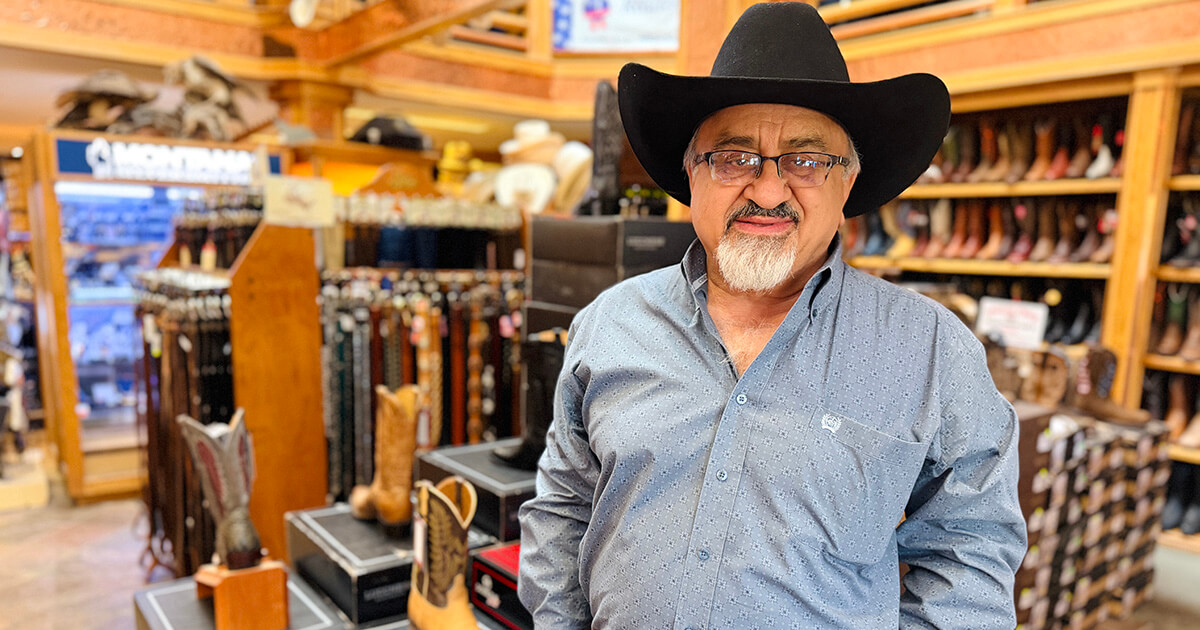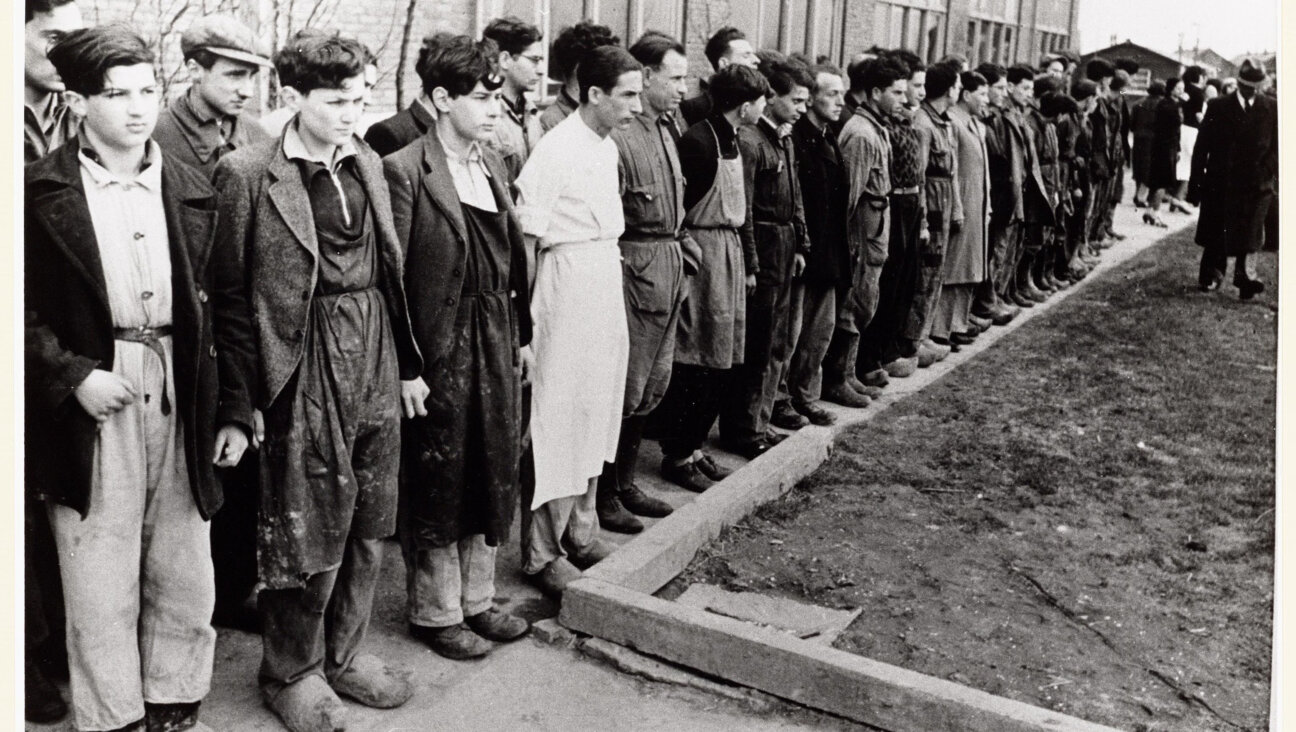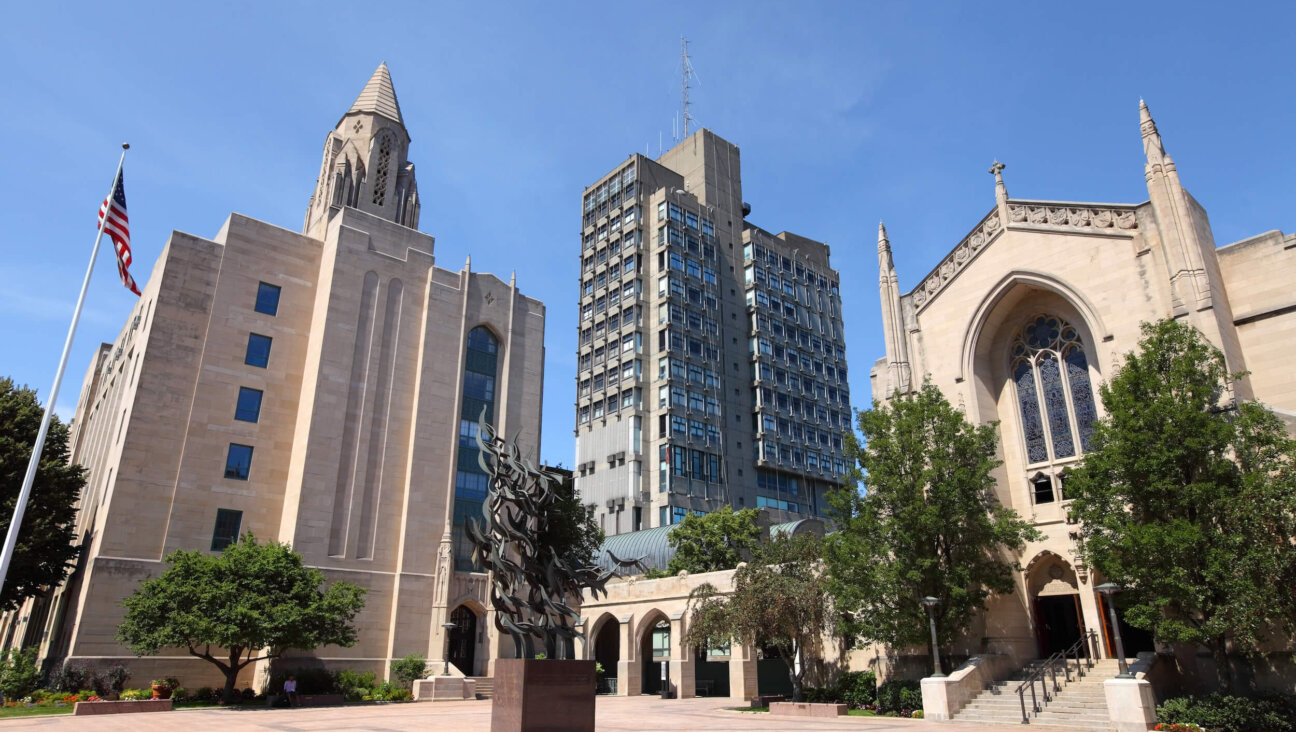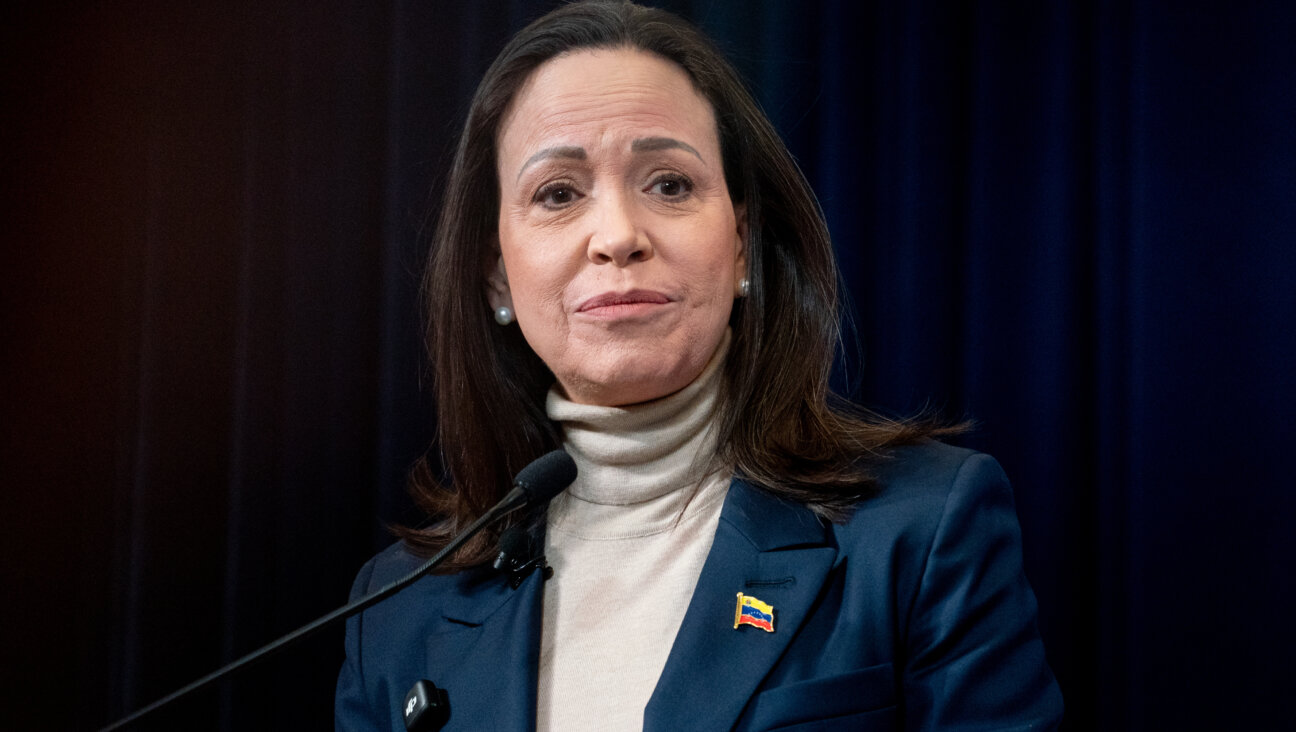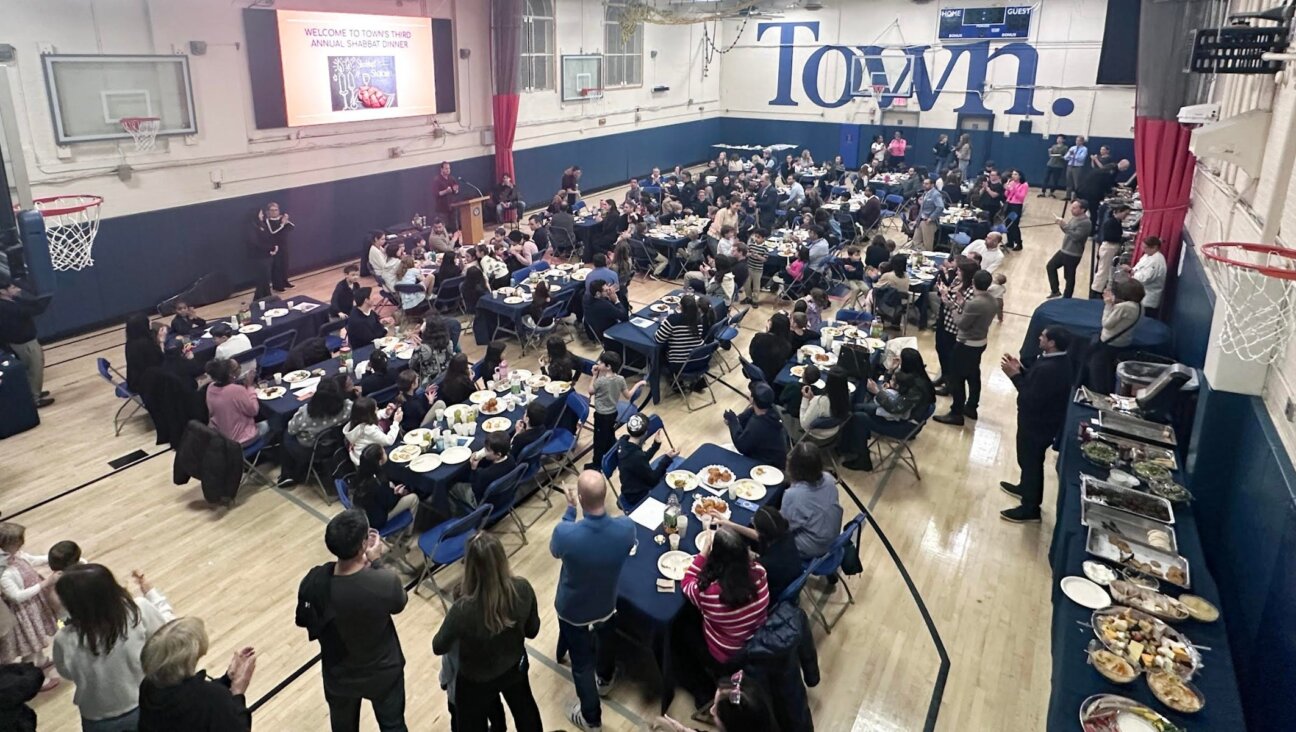When colleges shut down their ‘Gaza solidarity sukkahs,’ they prompted debates over anti-Zionist Jewish observance
Jewish students, many aligned with JVP, built structures for Sukkot that also served as protests against Israel
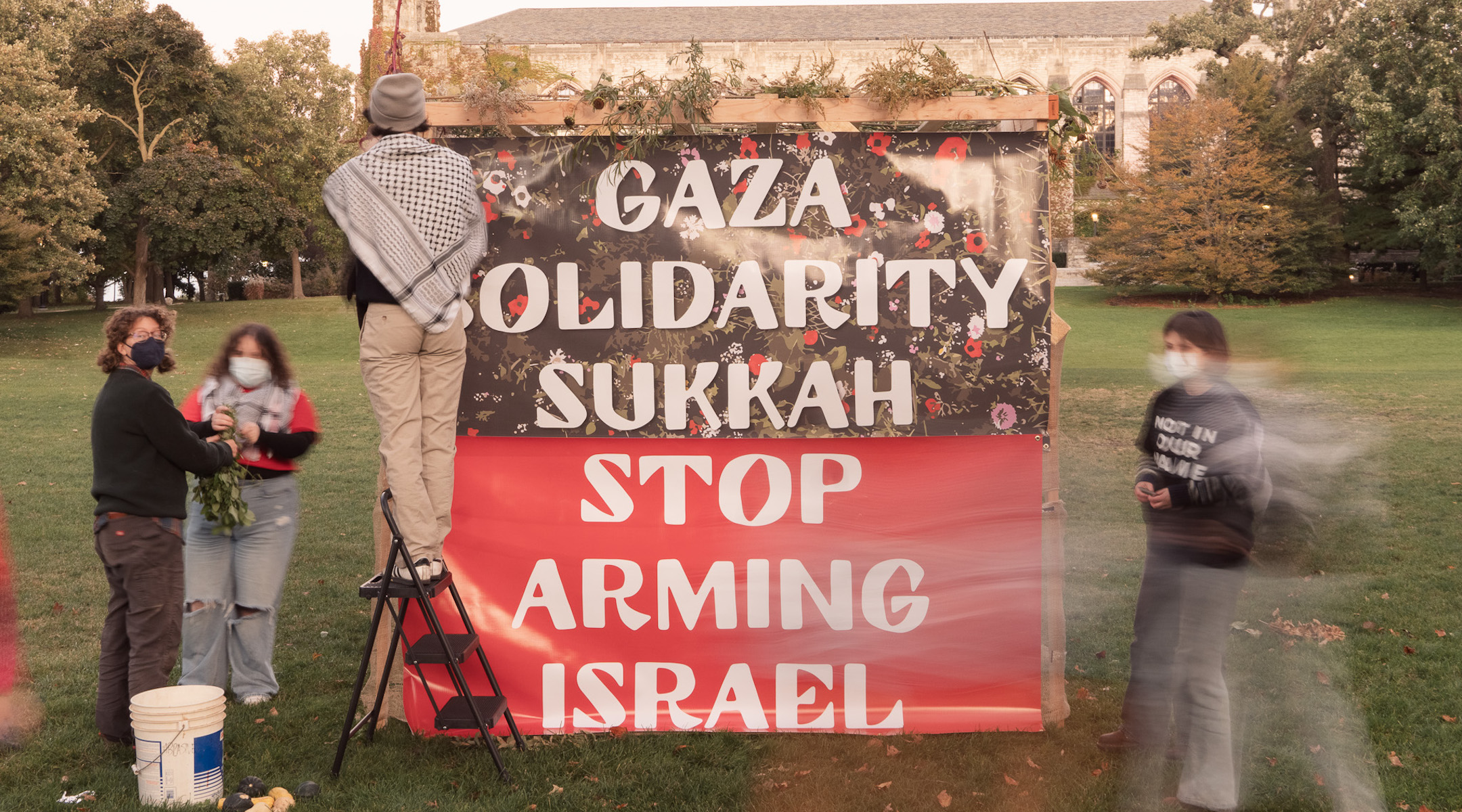
An anti-Zionist Jewish group constructs a “Gaza solidarity sukkah” on the campus of Northwestern University in Evanston, Illinois, for the holiday of Sukkot, 2024. (Courtesy of Jewish Voice for Peace)
(JTA) — Last week the Brooklyn rabbi Andrue Kahn received a request from a group of Jewish students at New York University: Would he come to lead prayers at their sukkah?
It wasn’t an unusual request for a rabbi during the holiday of Sukkot, but the circumstances behind it were decidedly more so. The student group was Jews Against Zionism, and the sukkah they constructed was what they called a “Gaza Solidarity Sukkah”: employing the traditional outdoor huts of the Jewish harvest festival to level pointed critiques at Israel’s ongoing military campaign in the Gaza Strip.
Jews Against Zionism NYU has also expressed vocal support for Within Our Lifetime, a radical pro-Palestinian group that advocates Israel’s destruction and whose protest targets — including Brooklyn’s “OY/YO” sculpture and an exhibit commemorating the victims of the Nova festival massacre — have led mainstream Jewish groups and a range of politicians across the political spectrum to charge it with antisemitism.
But Kahn didn’t bat an eye at the request, and came to Washington Square Park to lead the students in prayer and meditation. Because Jews Against Zionism reportedly hadn’t sought permission from NYU to build the structure, he had to do so from the other side of a barrier erected by campus police around the sukkah. (A spokesperson for NYU did not immediately return a request for comment.)
Shortly afterward, according to NYU’s student newspaper, the student group took down their sukkah voluntarily and ahead of schedule, citing “aggressive agitators” and claiming that campus police had treated them with hostility. Betar US, a right-wing pro-Israel group that traces its roots to pre-state Zionist activist Ze’ev Jablonsky, told the student paper they “happily and proudly” disrupted the sukkah. On Instagram, Betar referred to it and similar Gaza solidarity sukkahs as a “Jihaddi [sic] Sukkah” and referred to its participants as “thugs” and “terrorists.”
“We joined their Gaza Solidarity Sukkah and we will again and again and again. We don’t apologize,” Betar wrote on a post decorated with images of the “Inglourious Basterds” movie character The Bear Jew. “We celebrate Sukkot and you don’t.” Comparing the groups behind the solidarity sukkah to the Hitler Youth, Betar added, “You advocate for jihad, and terror and hatred and are anti-American and antisemitic.”
It was far from the only row over campus anti-Zionist versions of the sukkah this month.
Across the country, around two dozen anti-Zionist Jewish groups, most aligned with Jewish Voice for Peace, constructed their own Gaza solidarity sukkahs in a similar spirit to the Passover seders and Shabbat services they held in encampments this spring. With this year’s High Holidays falling around the one-year anniversary of Oct. 7, anti-Zionist Jews sought ways to merge their religious rituals with their political identities. While Sukkot was the most visible example of tensions around that, there were other signs of intra-Jewish unrest on campuses, including Harvard Hillel’s suspension of its chapter of the liberal pro-Israel group J Street U after the latter group initiated a Yom Kippur-themed flyering protest campaign.
The sukkahs were met with a range of reactions, mostly in opposition, from universities on edge about stoking further campus tensions around Israel. In many cases, the sukkahs were classified as unauthorized structures and removed by university administrators, who cited new public protest rules solidified in the aftermath of this spring’s pro-Palestinian encampment movement.
Such responses at times turned aggressive: Rutgers University, for example, brought a bulldozer to the site of its students’ anti-Zionist sukkah — where activists were chanting “L’chaim Intifada” — before ultimately removing it without the use of the construction vehicle. The students said they found this action especially offensive because the brand of bulldozer, Caterpillar, is routinely used in the West Bank by Israel and has long been a target of Israel divestment campaigns. (The family of American peace activist Rachel Corrie, who was killed by a Caterpillar bulldozer operated by the IDF in 2003, sued the company.)
So what was the Gaza solidarity sukkah movement and its institutional blowback? Was it a way to employ Jewish ritual to establish another encampment of sorts, given the overlap between the temporary structure of a sukkah and this spring’s efforts by pro-Palestinian groups to occupy campus spaces? Or was it an authentic effort to merge Jewish teachings with genuine Jewish anger at Israel over the colossal death toll in Gaza in the year-plus since the Oct. 7, 2023, Hamas attacks?
For those close to the anti-Zionist Jews, the answer was obvious.
“I thought that it was really important to support Jewish students looking to celebrate in a way that is meaningful to them,” Kahn, who until recently worked in the Hebrew school of the Reform Congregation Beth Elohim and has sharply criticized Israel from other pulpits in the past, told the Jewish Telegraphic Agency. “These students can’t go to Hillel or Chabad for their Jewish practice, because of their political beliefs. So they’re creating their own thing.”
Kahn was certainly sympathetic to the students’ politics: He is currently trying to relaunch the American Council for Judaism, a group that formed in 1942 to advance objections to the Reform movement’s growing embrace of Zionism. (The group’s influence began to wane a few short years later, after the Holocaust and the formation of the State of Israel led most Reform Jews to embrace Zionist ideas.)
At NYU’s Gaza solidarity sukkah, Kahn said, he saw more than an excuse to launch another protest against Israel. He saw a sukkah that, as far as he could tell, was heartfelt in its Jewish approach and fully in compliance with traditional sukkah construction, albeit one also adorned with slogans including “Disclose & Divest” and “Free Palestine.”
“As far as I could tell, it was a kosher sukkah. The roof was see-through, they had three walls. They were doing it,” he said, noting also the students had sourced a lulav and etrog for the occasion (Israel, Morocco and China are prime etrog exporters; Kahn said he didn’t know where the students’ was from).
Comparing the movement to the Freedom Seders of the civil rights era and afterward, Kahn said it fell in with a history of Jews merging political causes with their religious observance: “Although, yes, there were political messages on the sukkah itself, the intent of the students was a religious one.”
Elsewhere, the line between the sukkah movement and the encampments became blurred. At Columbia University, whose students originated the encampment movement, anti-Zionist Jews continued the language of their protester coalition by deeming their hut a “liberation sukkah.” At the University of Pennsylvania, students had founded their campus JVP chapter only days before hosting the sukkah. Some of the sukkot, like one at Northwestern University, were constructed on the same campus locations where the encampment movement had been held.
And the University of California, Los Angeles, played host to perhaps the most chaotic scene surrounding a Gaza solidarity sukkah. Joining up with a brief attempt to resurrect an encampment at the same spot, the sukkah shared space with a banner reading, “Resistance is justified from Warsaw to Palestine.” UCLA campus police soon broke up the display, arresting one protester for failing to obey a dispersal order as they broke up the sukkah, whose participants numbered around 40. A Betar group also showed up, threatening to “organize groups of Jews” to remove the display themselves until their progress was also halted by police.
Signs like the one at UCLA, that directly advocate for violence against Israelis, are why detractors say the Gaza solidarity sukkot shouldn’t be seen as authentic means of Jewish practice.
“Using these holidays as an excuse to justify the deadliest day for the Jewish people since the Holocaust does a disservice to Jewish students,” Julia Jassey, founder of the activist group Jewish On Campus, told JTA. Jassey pointed to the UCLA sign in particular.
UCLA authorities said the sukkah had violated several “time, place and manner” restrictions around campus speech, including “assembling in an area not designated for public expression, using unauthorized structures, and they have used amplified sound.” The justification was notable at UCLA, which recently received a legal ruling ordering it to do a better job protecting Jewish students’ freedom of movement throughout the campus.
And UCLA wasn’t the only site of a Sukkot clash between Jews. A Hillel sukkah at Simmons University, a private school in Boston, was vandalized with messages reading “Gaza Liberation Sukkah” this week. The university president condemned the action as “the antisemitic vandalism of a Jewish religious symbol on our campus” in a statement and said it was being investigated as a potential hate crime.
The school’s Hillel chapter also called the vandalism antisemitic in a statement, adding that its sukkah had been “co-opted through vandalism to make political statements” and that the act “sends a clear message: Jewish students are not welcome to openly celebrate and practice our customs.”
On Instagram the Simmons JVP chapter pushed back, posting an image of the graffiti and declaring, “This is not antisemitism.” The chapter argued that the wording of the vandalism “is quite clearly meant to represent these Gaza Solidarity Sukkahs” on other campuses, and declared that labeling it antisemitic instead of anti-Zionist “directly harms and endangers Palestinian students and BIPOC and Muslim students who support Palestine.” The JVP post added, “Drop Hillel. Drop this bs.”
Such endorsement of a sukkah sabotage was cause for alarm in some corners of the Jewish world, and the national JVP movement generally steered away from endorsing such actions. Instead it pushed the idea that most Gaza solidarity sukkahs were intended as alternative modes of Jewish practice for anti-Zionists. (Individual JVP chapters are given a degree of independence from the national movement to declare their own positions.)
“This year, students could not separate their observance from the fact that tens of thousands of Palestinians are forced to live in temporary shelters due to [the] Israeli military’s mass destruction of homes in Gaza,” JVP said in a news release last week about the solidarity sukkahs. Among the guests at these solidarity sukkahs were Jewish author Naomi Klein and Jewish pro-Palestinian activist Simone Zimmerman.
At some schools, students intended to stay in their sukkot for eight days, a Jewish tradition that is rarely practiced in full outside Orthodox communities. These students were prevented from doing so by their administrators in most cases. This was wrong, JVP maintained.
“The students explained that sleeping in Sukkahs is an essential part of this holiday and part of their religious rights, but administrators choose to disregard the students’ pleas,” the JVP statement said, calling the dismantling of the sukkahs “a desecration of a religious structure.”
Not every Gaza solidarity sukkah was built without trying to seek permission. At the University of Southern California, for example, a student JVP chapter sought and said it initially received permits to construct a sukkah at a religious center on campus. But, according to student newspaper The Daily Trojan, USC later denied the permits to JVP after catching wind of the group’s plans to adorn the sukkah with “political” messaging like a Palestinian flag banner. JVP later constructed its “solidarity sukkah” elsewhere on campus. (The school said it had denied the permit because the JVP chapter was not an officially recognized student organization.)
And at Brown University, the school initially approved permit requests from BrownU Jews for Ceasefire Now to host a Gaza solidarity sukkah, until the students announced their intent to sleep in the structure for eight days. This, Brown said in a statement to JTA, was a “prohibited” act. The university said it first attempted to quietly resolve the situation with the students. When the sleep-in continued, a spokesperson said, the school began initiating disciplinary proceedings against the students. The students themselves then took down the sukkah after the eight days of the holiday were up; they claim that 17 of them are currently facing potential conduct violations.
Such actions aren’t occurring in a vacuum. Days before at Brown, 150 activists had protested the university’s governing board after it voted down a proposal to divest from Israel; the school has since suspended its chapter of Students for Justice in Palestine for conduct violations related to the protest.
Some progressive Jewish observers who aren not students also denounced universities for shutting down the sukkot. Rabbi Lex Rofeberg, who runs the Jewish digital learning project Judaism Unbound and visited Brown’s Gaza solidarity sukkah, said this year’s Sukkot “should be remembered as a pivotal moment in the history of American Judaism” due to university actions against the solidarity structures, and alleged that universities had overstepped their bounds by policing them.
“It is not the place of universities to determine what is and is not an authentic manifestation of Jewish religious practice, as filtered through Bible, through Talmud, and through more recent Jewish texts,” Rofeberg wrote on the social network X. “And yet universities have asserted that that’s precisely their role.”
His position was supported by some prominent progressive Jews and Jewish groups, including Jews for Racial and Economic Justice. But not every Jewish analyst agreed. Haviv Rettig Gur, a commentator for the Times of Israel, described anti-Zionist sukkahs as “unkosher” and accused them of deploying a “cynical use of Palestinian iconography.”
For Kahn, the sukkah pointed to something much bigger.
“I think that the Jewish community needs to very broadly get used to having a greater diversity of Jewish expression,” he said.



